Summary 
Disco-era 1970s New York City variation on the problematic play emphasizes dark comedy despite the sexual harassment core story line, and features onstage nudity along with pantomimed sex and drug use. A few elements work better than most - Elbow as a New York street cop and Lucio channeling Russell Brand - but the pace is awkward and there is little to support a noble portrayal of a can't-catch-a-break Isabella.
Design
Directed by Robert Falls. Set design by Walt Spangler. Costume design by Ana Kuzmanic. Lighting design by Marcus Doshi. Original music and sound design by Richard Woodbury.
Cast
James Newcomb (Duke), John Judd (Escalus), Jay Whittaker (Angelo), A.C. Smith (Provost), Joe Foust (Cardinal/Barnardine), Kevin Fugaro (Claudio), Celeste M. Cooper (Isabella), Alejandra Escalante (Isabella), Jeffrey Carlson (Lucio), Cindy Gold (Mistress Overdone), Aaron Todd Douglas (Pompey), Sean Fortunato (Elbow), Kate LoConti (Mariana).
Analysis
Robert Falls brings Measure for Measure to disco-era New York City with little glitz and glamour but a sordid 1970s mix of cheap sex and street drug use. The stage of the Goodman's Albert Theatre is lined with a chain-link fence that is topped by barbed wire. Trash has accumulated along the base of the fence, wrappers and newspapers, even a Kentucky Fried Chicken bucket. The cast sings along to Donna Summer's "Love to Love Ya, Baby" and moves in surreal slow motion, drunks and drug-users, street people and thieves, hustlers and prostitutes, a kneeling-in-prayer Isabella vulnerable but beatific in their midst.
1.1 begins with a man led offstage by a chain from his nipples while blue-clad policemen patrol a metal skywalk above with shotguns, and the men snorting cocaine at a downstage right table are revealed to be the Duke and a priest. A nearly naked girl lies passed out near them, the "Holy Father" a red-robed man in a scarlet hat, a gold cross on his chest, cradling a snifter of brandy. Falls moves the action quickly, with James Newcomb's dissipated Duke - in bell-bottomed trousers, vest and red-striped tie - resolved to abdicate and moving to center stage with his briefcase. Amid the noise and lights of an approaching helicopter, he hands Escalus a manila envelope and grants executive power to the nerdy geek Angelo, a skinny young man in big plastic spectacles and short-cropped hair, wearing a gray suit with tan shoes.
Falls bookends another glimpse of the fervent Isabella in 1.4, moving her scene between 1.2 and 1.3, both of which begin with what becomes a trademark: slow motion like a drug-induced stupor. Neon signs light up - "Sex," "Live," "Peep Show," "Men Only" - around the pimp Pompey 1.2 in his green bell bottoms and brown leather jacket, a topless stripper gyrating upstage left to a disco bass-thump as Claudio can be seen in slow-motion defiance as he is separated by officers from the clearly pregnant Juliet. Action returns to normal speed in a fast-paced chaos, as Pompey - "y'all know what I'm talking about" - and other street denizens rail against the brutality of the police. Jeffrey Carlson's suede-green Lucio seems to be channeling Russell Brand in his fey indignation and audience-pleasing mannerisms. 1.4 presents a contrast, dark and quiet among distant pealing bells, Alejandra Escalante's devout Isabella clearly in her proper place praying within the nunnery. But Falls moves right back to the chaos with the next scene, The Rolling Stones's bass-heavy "Miss You" throbbing as the Duke moves 1.3 from upstage, disguising himself as a Friar in brown robe and wire-rimmed glasses, the action suddenly speeding up again.
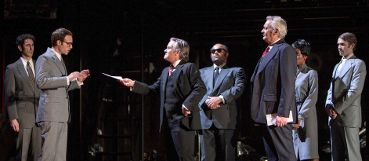
Falls's Act 2 sequences are the most successful scenes of the production, with the hard-working Angelo seated at a stage right desk, Escalus hovering officiously over him, as they face an array of defendants seated in shabby plastic-and-metal chairs. The men wear three-piece suits and have briefcases loaded with paperwork, discussing cases with the New York-accented cop Elbow - "my wife, sir, whom I detest before heaven" - who leans on the desk in his blue shirt with keys, baton, blue tie, and gold shield. Elbow nearly steals the scene in his porn star mustache, permed hair and heavy accent - "she performed...horatio on him" - not quite so different from the street people behind him, which include a pregnant woman, a girl sleeping in jeans and red high heels, a young man with spiked hair and an "Explicit" T-shirt, and a very hairy man in mesh stockings and a shoulderless dress. Angelo's decree is cold-blooded, with a decided pause between "whip them" and "all," and he adjourns 2.2 to his chambers to hear Juliet's case, referring to her as "the fornicatress." When Isabella implores him - "show some pity" - he is firm in his resolve, but after she innocently touches his arm, he turns away, weakening: "come to me tomorrow." Jay Whittaker plays Angelo not so much as a tempted statesman but as a closet perv, and when he looks down at his crotch - "what's this?" - he whimpers then lapses into a high-pitched giggle.
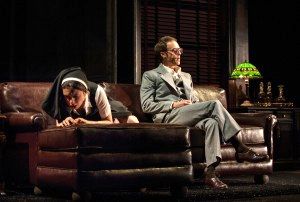
Falls's subsequent scenes work less well, the darkness of the actual harassment shot through with a comic strain, as Angelo's advances upon Escalante's unaware Isabella are played for laughs. Brightly lit, Whittaker's Angelo removes his jacket as if in a strip tease, then seats himself at the far end of the couch, scooching closer to Isabella, his feet together like an awkward teenager looking to make out with a new girlfriend. When he stands in frustration, he returns a moment later to sit on the armrest, then falls upon her. Isabella of course recoils in horror, but Angelo's response draws a nervous laugh from the audience - "I love you" - and when he moves his hand up her skirt, she shoves him over. Whittaker's Angelo then sits at his desk and casually crosses his legs: "my false outweighs your true." 3.1 is set in a modern police interrogation room, Newcomb's Duke now an odd leprechaun-like Puck with an Irish accent - "Father Moynihan" - manipulating events behind the scenes. He crosses himself and prays with Isabella, visible with her through an upstage window after Claudio's plea - "let me live!" - as he concocts his plan to expose Angelo.
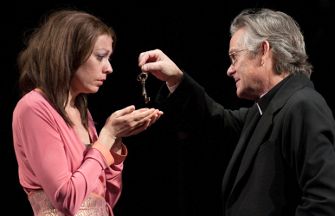
Falls follows an intermission with 3.2, as Newcomb's Friar stops a group of police officers from beating up Pompey. After a comic exchange with the mincing Lucio, action again slows to slow motion, the Duke at center stage watching the mean-street people around him, then a quick cut to fast motion as prostitutes, pimps and the homeless are rounded up and arrested by police officers in riot gear. Escalus swigs from a flask, hand on hip, obviously disapproving of the enforcement of moral laws as the arrested are lined against the chain-link fence to peer out at the audience. 4.1 reveals Newcomb's newly heroic Duke as still sordid and perverted. Mariana, confined in what appears to be a mental hospital, works a jigsaw puzzle center stage, accepting medication from a nurse - she opens her mouth to prove the swallow - and listening to disco music on a radio. When Newcomb's Duke describes his plan for them to switch places, he changes the music then sits silently and watchfully as the two young women stand, and in painfully self-conscious motions, strip off their clothes down to bras and panties to exchange them. Isabella is breathless, clearly violated, as the creepy Duke stands to remove her wimple and place it atop Mariana's head.
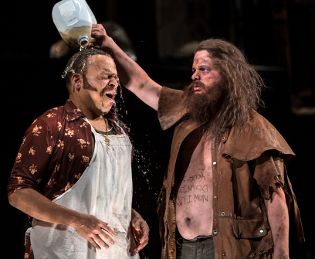
The uncomfortable scene gives way to jarring black comedy, an awkward lurch in tone that is disconcerting. The over-the-top characters seem to come from a completely different play. Pompey, amid prison guards with shotguns, jailhouse buzzer noises, and flanked by prisoners languishing in iron-barred cells, assists Abhorson, something of a cartoon mad scientist in a white smock, pushing a morgue body cart. A huge toe-tagged "corpse" lies on it, covered with a sheet, and first a leg then an arm falls free, so the doctor must rearrange the body. Abhorson's line - "you have a hanging look" - has both actors turning slowly to the audience in silent apology for the awful pun. After a comic pratfall by the Provost, hanging up a telephone and staggering into a bank of file cabinets after receiving word from Angelo - Whittaker himself speaks the decree from an upstage desk: "let Claudio be executed by four of the clock" - Barnardine emerges 4.3 from a downstage trap. The prisoner has long straggly hair, an unkempt beard, and an upside-down tattoo on his chest and belly - "now I lay me down to sleep" - and he pours a jugful of urine over Pompey: "I have been drinking...hard." When Barnardine pulls a switch blade knife on the Duke, the shotgun-wielding guards above turn and flee, and moments later Abhorson enters with a head in a bag as "proof" for Angelo, Pompey now blood-spattered and wearing eye-goggles and carrying a bloody chainsaw.
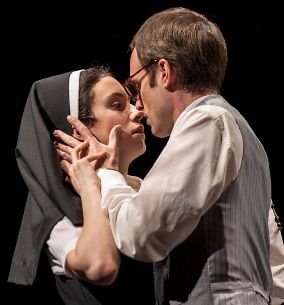
Falls cuts the remainder of Shakespeare's Act 4 following the declaration from Newcomb's Friar - "the Duke comes home tomorrow!" - but reveals Whittaker's Angelo on his knees in spot-lit prayer stage left, sneaking a peek inside the bloody plastic bag. The Duke returns in slow motion, again to the sound and light of an overhead helicopter, and motion speeds up as Angelo hurries to welcome him. Newcomb's Duke seems refreshed, wearing gloves and sunglasses and a trench coat, shaking hands and greeting everyone onstage. When Isabella cries out "justice!" she must flee police officers, and the swishing Lucio attempts to explain but is cut off by the Duke: "you were not bid to speak." Newcomb's Duke, again in full leprechaun mode, orchestrates the claims, Mariana appearing in a nun's black-and-white habit but a white wedding veil, and Whittaker's Angelo gives his high-pitched cackle - "this is a strange abuse" - before his expression falters - "I did but smile till now" - and he becomes angry in self-defense.
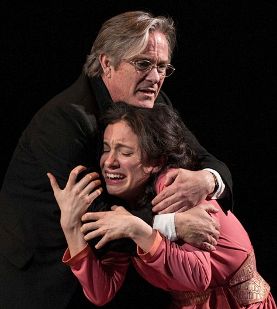
The concluding scene is played like a game by Newcomb's Duke, wrestling with Lucio then tearing off his eyeglasses to reveal himself as the barely disguised Friar. For some reason the whole cast seems duped, and they gasp and stagger backward in shock, although Angelo makes prayer-hands and falls to his knees, then to his hands and knees, and finally to his side in fetal position. The Duke sends Angelo and Mariana off to be married, and scolds Carlson's Lucio - "sneak not away, sir" - but is moved to tears by the pleading of Escalante's deeply wronged Isabella. Escalante's Isabella is the highlight of the show, a fine would-be anchor lost among the cheap humor and the machinations of the impish Duke.
The play's contrived plot lurches forward, tying up loose ends like Lucio's marriage and Barnardine's freedom, and after the Duke's awkward proposal to Isabella - "give me your hand and say you will be mine" - Falls tries to infuse some energy with a shock ending. While Barnardine ogles the beautiful Isabella, licking his fingers lasciviously, Donna Summer's "Last Dance" begins to play - slow and loud, poignant and melancholy - and Newcomb's Duke pushes the crowded stage into pairs of reluctant dancers. They dance, then clap and spin as the tempo of the music suddenly quickens, moving to the disco beat as Barnardine assaults Isabella in slow motion. He draws his knife, officers in pursuit, and stabs the unsuspecting Isabella - still reeling from the Duke's advances - and she collapses into the arms of the Duke. His scream of horror is matched, ironically, by the triumphant Donna Summer shout as "Last Dance" concludes, ending Falls's wildly uneven production on an appropriately wild and uneven blackout note.